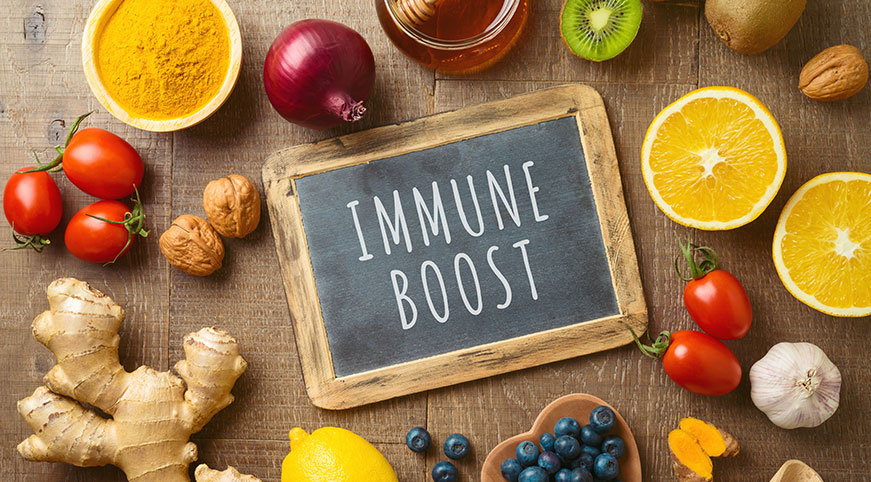Certain foods can help strengthen your immune system and getting a variety of these foods and nutrients in your diet can help maintain health and wellness. Olivia Marrone, Registered Dietitian, shares some of the best foods to support healthy immunity.
- Nuts: Nuts are high in iron, zinc, and magnesium, which are vital for the synthesis and function of immune cells. Certain nuts, such as walnuts, can also contain high levels of antioxidants, which limit tissue damage caused by infections. Studies have shown that consumption of nuts can prevent and treat various disease states by limiting risk factors related to lipid and glycemic metabolism, oxidative stress, and inflammation.3
- Red fruits: Red fruits are typically high in vitamin A, which has been proven to prevent infections by maintaining healthy tissues in the skin, mouth, stomach, intestines, and respiratory system.2 According to recent studies, vitamin A can enhance the immune system’s defense against various infectious diseases through roles in innate and adaptive immunity.4
- Whole Grains: Incorporating more whole grains into your diet is a great way to support immune function. First, whole grains are often high in zinc, which is necessary for wound healing and supports immune response.2 In addition, whole grains are high in fiber which feeds gut bacteria and promotes a healthy gut.5 This is important because the gut is a primary defense organism for the immune system. Studies have found that individuals who increased their whole grain consumption saw improvement in gut health and immune responses.5
- Citrus: Citrus fruits, such as oranges, lemons, and limes, are known as immune-boosting “super foods” due to their high content of vitamin C, a powerful antioxidant. Vitamin C prevents oxidation, stimulates the formation of antibodies, and promotes functionality of white blood cells.2 Recent studies have confirmed vitamin C’s role in immune support by showcasing its ability to reduce oxidative stress, prevent inflammation, and support the immune system.6
- Fatty fish: Fatty fish may be the most unexpected food on this list but it can provide major immune support due to its high Omega-3 and vitamin D content. Omega-3 fatty acids are proven to reduce inflammation and regulate the immune response.7 Vitamin D helps regulate antimicrobial proteins in the body which kill harmful bacteria.2 A recent study confirmed the positive impact of fish on immune function due to the functionality of omega-3 fats and vitamin D in immune support.7
While food cannot increase the functionality of the immune system beyond its natural level, consuming an adequate, balanced diet, can prevent immunodeficiency caused by malnutrition.
Sources:
1“Nuts and Immunity .” Nuts for Life , Australian Tree Nuts for Nutrition & Health, 25 Mar. 2021, https://www.nutsforlife.com.au/nuts-and-immunity/.
2Pronschinske, Jamie. “Nutrition and Immune Function.” Mayo Clinic Health System, 16 Nov. 2021, https://www.mayoclinichealthsystem.org/hometown-health/speaking-of-health/support-your-immune-function-with-good-nutrition.
3de Souza, Rávila Graziany Machado, et al. “Nuts and Human Health Outcomes: A Systematic Review.” Nutrients, MDPI, 2 Dec. 2017, https://www.ncbi.nlm.nih.gov/pmc/articles/PMC5748761/.
4Huang, Zhiyi, et al. “Role of Vitamin A in the Immune System.” Journal of Clinical Medicine, MDPI, 6 Sept. 2018, https://www.ncbi.nlm.nih.gov/pmc/articles/PMC6162863/.
5Tufts University. “Eating whole grains led to modest improvements in gut microbiota and immune response.” ScienceDaily. ScienceDaily, 8 February 2017, www.sciencedaily.com/releases/2017/02/170208151337.htm.
6Miles, Elizabeth A, and Philip C Calder. “Effects of Citrus Fruit Juices and Their Bioactive Components on Inflammation and Immunity: A Narrative Review.” Frontiers in Immunology, Frontiers Media S.A., 24 June 2021, https://www.ncbi.nlm.nih.gov/pmc/articles/PMC8264544/.
7Mendivil, Carlos O. “Dietary Fish, Fish Nutrients, and Immune Function: A Review.” Frontiers in Nutrition, Frontiers Media S.A., 20 Jan. 2021, https://www.ncbi.nlm.nih.gov/pmc/articles/PMC7855848/.
Go to our Blog
 ENGLISH
ENGLISH KOREAN
KOREAN Spanish
Spanish RUSSIAN
RUSSIAN Armenian
Armenian FILIPINO
FILIPINO Chinese (Simplified)
Chinese (Simplified) Chinese (Traditional)
Chinese (Traditional)


최신댓글